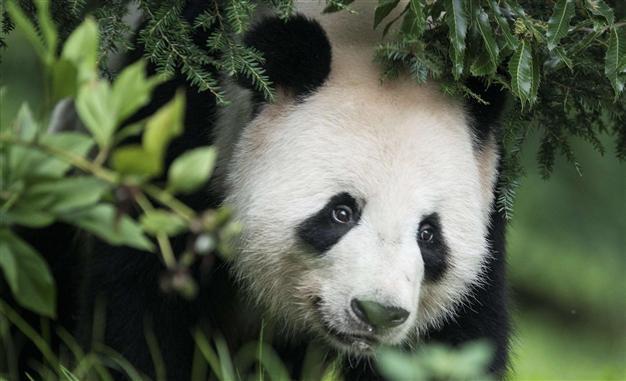Britain's panda may be pregnant, says zoo
LONDON - Agence France-Presse

AFP photo
Hopes are high in Britain that it will get its first panda cub after Edinburgh Zoo said Friday there were "strong indications" that its female panda is expecting.
The zoo said Tian Tian, who along with her male companion Yang Guang is spending a decade in the Scottish capital on loan from China, was showing changes in her hormone levels and exhibiting behavioural changes associated with pregnancy.
"Things are looking good," Iain Valentine, director of the zoo's panda project, told BBC television.
"It's hugely exciting. There's never been a baby panda born in the UK." The zoo has tried repeatedly to make Tian Tian ("Sweetie") and Yang Guang ("Sunshine") mate since they arrived in Edinburgh in December 2011, but without success.
Tian Tian was artificially inseminated in April.
Four months later, Valentine said things were looking up -- with keepers spotting changes in her behaviour, including a lack of appetite, moodiness, and signs that she is "nesting".
There have also been changes to her protein levels and an increase in her progesterone hormone levels.
Edinburgh says it is unable to carry out an ultrasound and will not know for certain whether Tian Tian is pregnant until shortly before she gives birth -- which could be as early as next month.
If she is pregnant with twins -- as is often the case with pandas -- the cubs could have different fathers as the zoo used two different males for the artificial insemination, including Yang Guang.
Pandas are famously disinterested in sex for most of the year, and even when they do couple they must adopt a very precise position in order to mate successfully.
Tian Tian and Yang Guang are Britain's only pair of giant pandas. Previous attempts to encourage them to mate have involved building a "tunnel of love" between their separate enclosures at the zoo.
Edinburgh said it was realistic about the prospect of failure this time around.
"It happens all the time," said the zoo's chief executive Chris West.
"We are used to that sense of 'maybe pregnant, maybe not' -- we'll see. If she isn't, we will go round again." Edinburgh is paying around $1 million (750,000 euros) a year to Chinese authorities for the pandas, which have attracted large crowds at the zoo.
If a cub is born at the zoo, it will spend two years in Scotland before returning to China.
Fewer than 1,600 pandas remain in the wild, mainly in China's Sichuan province, with a further 300 in captivity around the world.
Last month a panda cub was born in Taiwan, while a panda in the United States also gave birth to twins. Both females had undergone artificial insemination.
